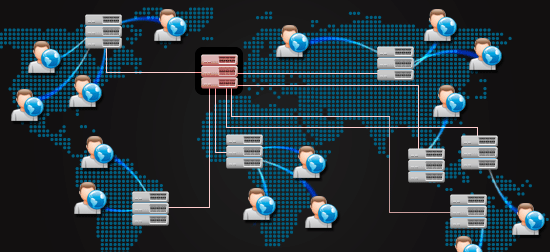|
|
|
|
Continue reading ETI Views and News at
econtech.com,
or download a
printer-friendly version.

Follow us on Twitter @EconAndTech
|
|
Netflix, Google bring content to the network edge
|
|
 Caching content at the network edge close to the end user is not a new concept. Content Delivery Networks (CDNs) such as Akamai and SAAVIS have been providing such services since the late 1990s. What is new is that several major web-based companies are taking this service in-house, and collocating their own servers at ISP-owned facilities. CDNs have long been a win-win for website owners and ISPs, speeding up delivery of web content while reducing traffic on Internet backbone networks. Now individual web companies are striking deals directly with ISPs and installing their own servers at ISP locations.
Caching content at the network edge close to the end user is not a new concept. Content Delivery Networks (CDNs) such as Akamai and SAAVIS have been providing such services since the late 1990s. What is new is that several major web-based companies are taking this service in-house, and collocating their own servers at ISP-owned facilities. CDNs have long been a win-win for website owners and ISPs, speeding up delivery of web content while reducing traffic on Internet backbone networks. Now individual web companies are striking deals directly with ISPs and installing their own servers at ISP locations.
Netflix is delivering nearly one billion hours of video per month worldwide and has accounted for some 35% of all Internet traffic at the end of 2011. Without the capability to serve content at the network edge, Netflix (and many other web-based businesses) would experience serious transmission capacity constraints. Netflix's new "Open Connect Content Delivery Network" appears designed to circumvent disputes such as those between Level3 and Comcast over the local delivery of video content. Netflix magnanimously offers its in-house CDN services at no cost. "ISPs can choose to have Open Connect Appliances within their datacenters, or to peer with the Open Connect network at common Internet Exchanges. Netflix will provide either form of access at no cost to the ISP."
This vertical integration of content delivery services by the largest web properties makes good business sense, but raises some competitive concerns. Small competitors that do not have the operational scale or clout to negotiate their own CDN deal with ISPs nationwide will be forced to pay for IP transit from a central web server, or for a third party CDN service, thus raising their costs above larger rivals. Net Neutrality concerns also surround these deals. Most of these in-house CDN relationships are secret and not subject to disclosure, leading to worries that larger companies are negotiating favorable treatment of traffic being delivered by the CDN, or that ISPs will inherently favor content that doesn't increase backbone traffic loads or peering costs.
For more information, contact Colin B. Weir at cweir@econtech.com
Read the rest of Views and News, June 2012.
|
|
|
|
About ETI. Founded in 1972, Economics and Technology, Inc. is a leading research and consulting firm specializing in telecommunications regulation and policy, litigation support, taxation, service procurement, and negotiation. ETI serves a wide range of telecom industry stakeholders in the US and abroad, including telecommunications carriers, attorneys and their clients, consumer advocates, state and local governments, regulatory agencies, and large corporate, institutional and government purchasers of telecom services. |
|
|
|
|